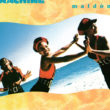A personal and intimate homage to his roots.
Malian musician Samba Touré’s new album (Glitterbeat Records), his 7th to date, is rooted in the Songhai blues tradition and is his first entirely sung in Songhai.
From the 15th to 16th centuries, the Songhai Empire was the largest in Africa stretching across the Western Sahel and Sudan with Timbuktu its cultural and economic jewel at the centre.
In his element, the smooth guitar and Touré’s warm voice draw you along for a ride through the sun-drenched Sahara and Songhai history. Infectious riffs cut through the silence from the opening with the traditional song Tamala, which celebrates the empire’s legacy and culture.
Often cited as the successor of his mentor the late Ali Farka Touré, Samba Touré’s songs are rich in meditative guitar refrains. While there are similarities to the master of the desert blues, Samba Touré has carved out his own style and his songs have a sharp political edge.
Binga is named after a small village in the rural Tombouctou region of Mali where he grew up. Far from a rose-tinted view of the past, Samba Touré has a nuanced view of his homeland and he noted recently in an interview with RFI that this rural community is now at risk of disappearing with their main source of survival the Niger River polluted by industrial activity and litter.
Atahar laments the problems in the Malian education system, but other songs like Sambalama are more hopeful, accompanied by a gentle yet persistent rhythmical tapping, pushing us forwards to a better future.
Recorded with only a small band; guitar, ngoni, calabash, minimal percussion and occasionally the harmonica, the album has an intimate resonance.
Binga lacks the variety displayed in previous album Gandadiko, but is overall a self-assured and masterful musical offering.








